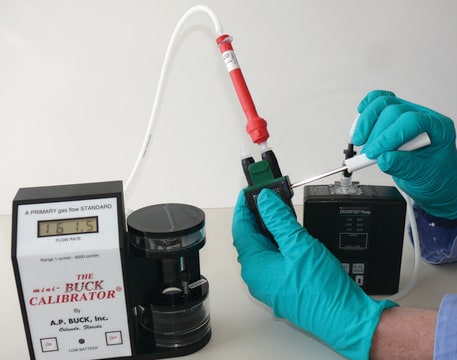29532-U
Carbotrap® 300 Thermal Desorption Tube
glass, O.D. x I.D. x L 1/4 in. × 3 1/2 in., fritted, preconditioned, pkg of 10 ea
About This Item
Prodotti consigliati
product name
Carbotrap® 300, glass TD tube, fritted, O.D. × L 1/4 in. × 3 1/2 in., preconditioned, pkg of 10 ea
Materiali
glass TD tube
agenzia
EPA TO-1,TO-2,TO-3,TO-17
Descrizione
Sealed with TDS³ Storage Container
Nome Commerciale
Carbotrap®
Caratteristiche
fritted
preconditioned
Confezionamento
pkg of 10 ea
Caratteristiche più verdi
Waste Prevention
Safer Solvents and Auxiliaries
Learn more about the Principles of Green Chemistry.
sustainability
Greener Alternative Product
tecniche
active air sampling: suitable
D.E. × lungh.
1/4 in. × 3 1/2 in.
Matrice
Carbosieve S-III carbon molecular sieve (CMS)
Carbotrap® 300 (Packed with Carbotrap C, Carbotrap B, Carbosieve SIII)
Carbotrap® C graphitized carbon black (GCB)
Carbotrap® graphitized carbon black (GCB)
applicazioni
air monitoring
environmental
industrial hygiene
Compatibilità
for use with PerkinElmer, Markes, DANI, OI Analytical, and Shimadzu Instruments
Categoria alternativa più verde
Cerchi prodotti simili? Visita Guida al confronto tra prodotti
Descrizione generale
Note legali
Codice della classe di stoccaggio
11 - Combustible Solids
Classe di pericolosità dell'acqua (WGK)
nwg
Punto d’infiammabilità (°F)
Not applicable
Punto d’infiammabilità (°C)
Not applicable
Scegli una delle versioni più recenti:
Certificati d'analisi (COA)
Ci dispiace, ma al momento non ci sono COA disponibili online per questo prodotto.
Se ti serve aiuto, non esitare a contattarci Servizio Clienti
Possiedi già questo prodotto?
I documenti relativi ai prodotti acquistati recentemente sono disponibili nell’Archivio dei documenti.
Il team dei nostri ricercatori vanta grande esperienza in tutte le aree della ricerca quali Life Science, scienza dei materiali, sintesi chimica, cromatografia, discipline analitiche, ecc..
Contatta l'Assistenza Tecnica.







